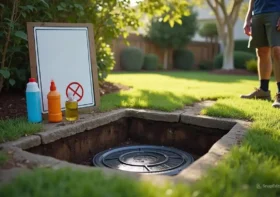How to Prepare for an Emergency Plumbing

Unexpected events often occur: a pipe bursts, the toilet leaks, or water floods the kitchen floor. During a plumbing emergency, every moment is crucial. This blog will show you how to prepare for a plumbing emergency so you can act quickly and stay in charge.
Contents
1. Know Where the Main Water Shut-Off Valve Is
You can prevent flooding in your home by locating the main water shut-off button in advance of the possibility of flooding. By closing this valve, the water supply to your home will be cut off. The water meter, the basement, or a wall outside are the typical locations where it can be found.
Use some of your time to locate the opening, and then make sure that other individuals in your home are aware of its location. It is recommended that you practice turning it on and off before you actually need to.
You can prevent a pipe from breaking or a leak from occurring if you are familiar with this process.
2. Keep Emergency Plumbing Tools Handy
When you have a plumbing problem, a plunger, pipe wrench, plumber’s tape, and a bucket can help you a lot. These tools are cheap and can help stop leaks, make joints tighter, and clear out jams.
Put these things somewhere that is easy to get to. It could be under the sink or in a closet in the hall. You won’t waste time looking when trouble starts.
3. Learn Temporary Fixes for Common Issues
You can buy some time before the plumber comes by learning how to do a few quick fixes. Put a bucket under a pipe that is dripping or use plumber’s tape to stop a small leak. If your toilet or sink gets clogged, a plunger can clear it out. Towels clean up messes quickly and keep water from getting everywhere.
For easy ideas, watch movies or ask a plumber for help when they come out regularly. You don’t have to fix everything; just slow it down. Short-term fixes give you time to breathe, lessen the damage, and keep you calm while you wait for help.
4. Create a Contact List of Trusted Plumbers
You shouldn’t wait until you need a plumber to find one. Plan ahead and make a list of plumbers who are available 24 hours a day, seven days a week. Keep their phone numbers handy and write them down somewhere easy to see.
Pick someone whose prices are clear and who has good reviews. Get names from people you know and trust. You won’t waste time looking online when water starts to leak or a toilet won’t stop.
5. Know the Signs of a Plumbing Emergency
Find out what signs really mean trouble. Bad smells, low water flow, and pipes that bang can all be signs of a bigger problem. If you see watermarks on the walls or floors, there may be a leak that you can’t see. A gurgling toilet or overflow could mean that there is trouble with the sewer.
Monitor any alterations in your plumbing system. If you don’t pay attention to small signs, they can turn into big, expensive problems.
Educate Household Members
If you know where the water shut-off valve is or keep some simple tools close by, you can act quickly when something goes wrong. It’s important not to be the only person who knows what to do.
Good Hands Plumbing Sydney assistance takes time to educate family members. When you need it most, their team can give you sound advice, dependable emergency help, and peace of mind.



